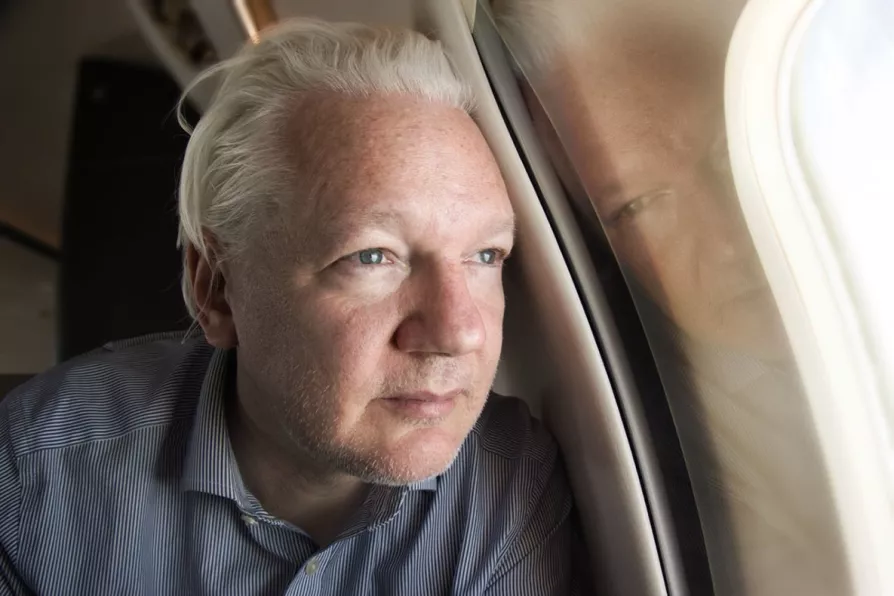
 Screen grab taken from the Twitter account of Wikileaks of Julian Assange on board a flight to Bangkok, Thailand, following his release from prison, June 25, 2024
Screen grab taken from the Twitter account of Wikileaks of Julian Assange on board a flight to Bangkok, Thailand, following his release from prison, June 25, 2024
JULIAN ASSANGE’S release from prison was hailed as a victory for press freedom around the world today.
The WikiLeaks founder was freed from Belmarsh prison on Monday, where he had been fighting extradition to the United States for five years.
Mr Assange was released after reaching a plea deal with US prosecutors. He is due to plead guilty to an Espionage Act charge of obtaining and disclosing classified US national defence documents.
US authorities have recommended a prison sentence of 62 months in custody, equal to the time he served in Britain. The deal would credit the time served, allowing Mr Assange to return immediately to Australia.
Mr Assange set off from Stansted airport to the remote Pacific island of Saipan, a US territory, today where his plea and sentencing is scheduled for tomorrow.
He had to pay $520,000 (£394,000) for the chartered flight. A crowdfunder campaign has been set up to cover the costs.
Celebrating the news, Mr Assange’s wife Stella wrote on X: “Words cannot express our immense gratitude to you, yes you who have all mobilised for years and years to make this come true.”
She said her husband’s release would not have been possible without intervention from Australian Prime Minister Anthony Albanese, who had been lobbying the US to drop the charges.
Ms Assange said her husband will seek a pardon as the acceptance of guilt on an espionage charge was a “very serious concern” for journalists around the world.
The WikiLeaks founder was wanted by US authorities on 18 counts relating to the release of hundreds of thousands of classified military records.
He became embroiled in a prolonged legal battle over his extradition; for seven years he sought refuge in London’s Ecuadorian embassy before being imprisoned in Belmarsh.
Mr Assange faced up to 175 years in jail under the WWI-era Espionage Act, which was initially used to prosecute spies.
In January 2021, English district judge Vanessa Baraitser said that Mr Assange should not be sent to the US, citing risk of suicide. But later that year, US authorities won their bid to overturn the block on his extradition.
The court granted a full hearing over whether Mr Assange would be allowed to rely on the US constitution’s first amendment, which protects freedom of speech, in May.
If the court found that it was not a safe assumption, Mr Assange may have been released. If it decided that the US could apply the rights then it could have made prosecution more difficult.
Following his release, International Federation of Journalists president Dominique Pradalie said: “Julian Assange is free. Victory for the right to inform and to be informed. Victory for journalists around the world.”
Reporters Without Borders director Rebecca Vincent echoed it as a “long overdue victory for journalism and press freedom.”
She said: “We will continue to campaign in support of journalists around the world who find themselves targeted for national security reporting, and for reform of the US Espionage Act so that it can never again be used to target journalistic activity.”
Stop the War national officer John Rees helped fight for the campaign to free Mr Assange.
He told the Star that the US and British governments had reached the point where prosecuting had become “too politically painful” thanks to those campaigning relentlessly to keep the case in the public eye.
“If that protest hadn’t been there, they could have quietly buried Assange in a supermax prison in the United States and nobody would have been able to contest it,” he said.
“I don’t think either [US candidates] Trump or Biden wanted a case that’s that hot landing in their lap during a presidential election.”
In a statement on X, WikiLeaks said: “This is the result of a global campaign that spanned grass-roots organisers, press freedom campaigners, legislators and leaders from across the political spectrum, all the way to the United Nations.
“As [Mr Assange] returns to Australia, we thank all who stood by us, fought for us, and remained utterly committed in the fight for his freedom. Julian’s freedom is our freedom.”

Campaigners say there is clear evidence British weapons are contributing to war crimes as the government goes on trial to defend its continued supply of arms to Israel

Unions and campaigners condemn Prime Minister's ‘far-right’ rhetoric and new immigration policies















